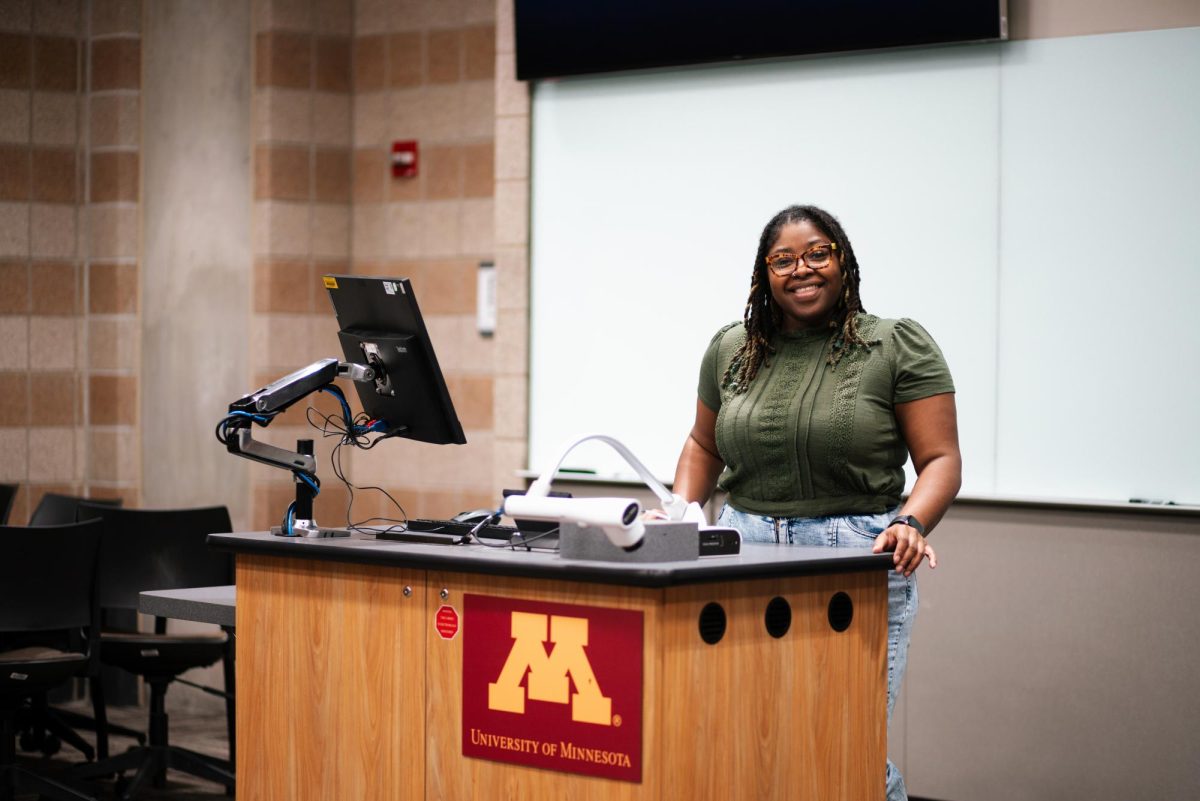Minneapolis City Councilmember Robin Wonsley (Ward 2) and University of Minnesota student organizations kicked off their project to occupy empty Dinkytown commercial buildings at the Carlson School of Management on Thursday.
The project is the Dinkytown Chronic Vacancy Solution Collaboration (DCVSC), a combined effort of Councilmember Wonsley’s office, Undergraduate Student Government (USG), Carlson Impact Lab and the Minneapolis Downtown Council Chameleon Shoppes initiative.
Wonsley and project stakeholders met with 48 Carlson School of Management students who have spent this semester researching the issue of chronic vacancy in the area.
The city issued an ordinance addressing chronic vacancies in Minneapolis in 2023. A product of the city-wide vacancy issue, the collaboration aims to revitalize Dinkytown’s commercial economy by bringing local businesses into vacant properties.
Wonsley said amid a housing crisis, business owners have struggled to find affordable properties across the city, especially in Dinkytown.
“We’re also seeing local businesses struggle to stay in the area,” Wonsley said. “Especially small businesses, and that’s leaving an opening for many of the commercial spaces to be occupied by large, out-of-state corporate businesses that don’t necessarily have a stake in the community.”
The collaboration between USG, Carlson Impact Lab and Wonsley’s office was initiated by Katie Smithberg, a fourth-year student at the University and the Government and Legislative Affairs Local Coordinator for USG.
Smithberg said she noticed several vacant buildings, such as University Food Hall and Loring Pasta Bar, and wanted to know what could be done to bring back businesses.
“[I] went to Councilmember Wonsley’s office with that list [of vacant buildings] and the request of like, ‘What can we do about this?’” Smithberg said. “We want Dinkytown to be a vibrant area where students can thrive in both the business community and the residential community as well.”
Smithberg added that to succeed in tackling this issue, student input is crucial because University students drive the majority of business in Dinkytown.
“I’m really excited that the people researching this are going to be students,” Smitherberg said. “They offer a really valuable perspective to this issue and I really want to see the work being done as a result that is going to make Dinkytown a better place to live.”
Carlson Impact Lab is newly implemented and required in the Carlson School curriculum, according to Amee McDonald, the managing director of the class.
Split into two semester-long courses, the Impact Lab first teaches students the foundations of problem-solving and handling ambiguity. The second course requires students to apply those skills to real-world projects. This semester, the project is the chronic vacancy collaboration.
McDonald said her students have spent the beginning of the semester researching “the role of the city, the role of the University” and “the consequences of chronic vacancies” to better understand the root causes of chronic vacancy in Dinkytown.
A distinction of the DCVSC from city-wide vacancy efforts is its understanding of Dinkytown as a unique economic environment.
Kent Kramp, president of the Dinkytown Business Alliance and the owner of Dinkytown’s Raising Cane’s location, said businesses in a University neighborhood face a specific set of economic challenges.
“The most glaring [issue] to me is something that we struggle with in our business, which is being on a college campus,” Kramp said. “You have to be able to handle having almost your entire population move away for an entire summer and winter break.”
Smithberg said addressing this economic challenge is a primary focus of the collaboration.
“[We’d] like to make sure that one, the entrepreneurs that come to Dinkytown will be fit for this place,” Smithberg said, “We don’t want people to be put in a situation where they’re not going to thrive as business owners.”
Kramp said another important factor to consider in Dinkytown’s chronic vacancy is the difference between local business ownership and chain management.
“A manager is less likely to go outside and sweep the sidewalk, a manager is a lot less likely to stay late and go to a community meeting,’” Kramp said. “I’ve got managers that go above and beyond, I know other businesses in Dinkytown certainly do, but you really change it when the ownership isn’t local.”
Wonsley said the DCVSC is prioritizing protecting local businesses as stakeholders in the community in addition to student involvement.
“We want to see [vacant properties] be occupied by local business owners so that we’re making sure we’re protecting local ownership and making sure that we’re having stakeholders like business owners come into the space and know, and care, about having a stake in our local communities,” Wonsley said.
McDonald said in addition to being fundamental members of the Dinkytown community, the students bring a fresh perspective to the issue, allowing them to ask difficult questions and put effort into seeking answers.
“The biggest thing they bring to the table is that beginner lens, that beginner mindset, that curious approach,” McDonald said. “Being able to ask those tough questions, knowing that they’ve got access to experts and faculty members that can point them in the right direction and teach them about the tools that can make these projects come to fruition.”
Wonsley said engaging University students in the legislative process is an advantage special to Ward 2 and will be especially valuable as the DCVSC progresses.
“We have this amazing asset in our ward to be a hub to so many emerging leaders and existing experts,” Wonsley said. “Why would we not leverage that, especially in this role of policy creation and problem-solving?”






















